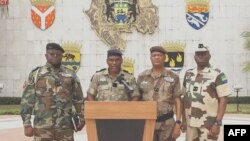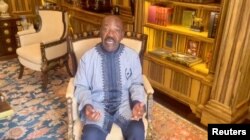Gabon military leader General Brice Oligui Nguema says former president Ali Bongo, who was toppled in an August 30 coup, has been freed from house arrest.
The junta also announced the creation of a transitional constitutional council.
Colonel Ulrich Manfoumbi Manfoumbi, spokesperson of Gabon's Committee for the Transformation and Restoration of Institutions, declared on Gabon National Television that, for health reasons, Bongo has been released and can seek medical treatment abroad.
Bongo had a stroke in October 2018, which left him physically impaired, with difficulty moving his right leg and arm. He frequently visited foreign hospitals for treatment, according to Gabon's military junta.
The military junta announced Bongo's freedom after Abdou Abarry, head of the United Nations Regional Office for Central Africa, met with the deposed leader in Libreville.
Abarry said Bongo is in good health and wants the preservation of peace and social cohesion in Gabon.
Jean Christophe Nang, a secondary school teacher in Bitam, a commercial town on Gabon's northern border with Cameroon, said military leader Nguema — a first cousin of Bongo who led the ousted president's security team — should have prohibited Bongo from leaving Gabon.
Gabon needs Bongo to provide information on the large fortune his family and friends have amassed from the misuse of public funds and corruption in oil exploitation deals, Nang said. He added that Nguema should watch out because Bongo, whose family has ruled for close to 60 years, and his supporters may have plans to destabilize Gabon.
Bongo came to power in 2009 following the death of his father, Omar, who had led the central African country since 1967.
Gabon's opposition says the family ruled with an iron fist and confiscated most of the oil-producing nation's wealth.
Nang said countries should help Gabon recover ill-gotten wealth hidden by the Bongo family.
New constitutional council
The military junta said a transitional constitutional council has been created, and Dieudonné Aba'A Owono, a civilian magistrate, was appointed as president. Civilians were appointed to govern the nine regions that make up Gabon. The junta also appointed Brigadier General Rapontchombo Judes Ibrahim to manage the Libreville city council during a period of transition.
Nguema said officials of the transitional constitutional council will be officially installed in the days ahead.
Gabon's dissolved constitutional council was created by Omar Bongo, Ali Bongo's father, in 1991.
Marie Madeleine Mborantsuo — the country's top magistrate and the elder Bongo's one-time romantic partner — served as president of the constitutional council from its creation until it was dissolved by the military junta last week.
Mborantsuo said she welcomes the creation of another constitutional council because Gabon has entered a new era and all of its institutions need to be rebuilt. She added that she spoke with Nguema and is ready to hand over power to the president of the newly created transitional constitutional council.
Despite the appointment of civilians and the apparent popularity of Nguema, the United Nations, the African Union, the Economic Community of Central African States, and the Central African Economic and Monetary Community continue to call on Gabon's military junta to hand over power to civilian rule.





